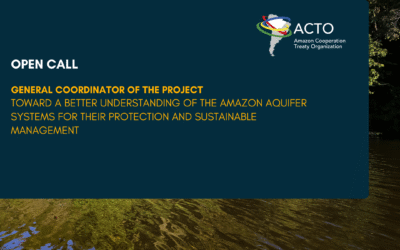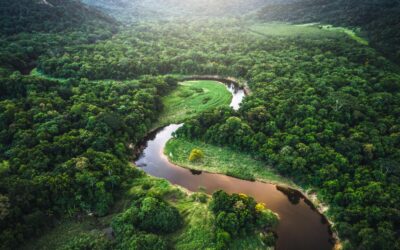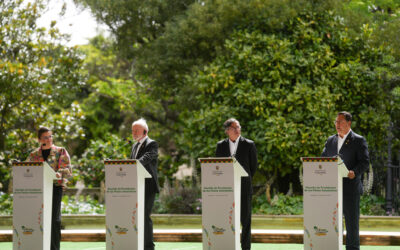Bogotá, August 20, 2025 (@OCTAnews) – Strengthening regional cooperation to protect the Amazon remains the priority of the Amazon Cooperation Treaty Organization (ACTO). Therefore, during the preparation for the V Summit of the Presidents of the Amazon Cooperation Treaty, ACTO promoted different spaces for academics, indigenous peoples, civil society, and state representatives to discuss the thematic axes and finalize the structuring of concrete proposals to be taken to the meeting of leaders, which will take place this Friday, August 22, at the Plaza de Armas of the Palacio de Nariño in Bogotá.
One of the priority discussions was related to the creation of a regional financial mechanism for the Amazon, which seeks to channel international resources for coordinated actions for conservation, sustainable development, and cooperation in the Amazon region, the largest tropical forest in the world.
“With this mechanism, ACTO will be able to carry out this strategic agenda for Amazonian cooperation, which is currently being updated, and fulfill the mandate given to it by the eight countries that comprise it (Brazil, Colombia, Peru, Venezuela, Ecuador, Bolivia, Guyana, and Suriname),” said Edith Paredes, ACTO’s administrative director.
In order to successfully create this mechanism, it is necessary to have governance and an administrative structure that provides for periodic accountability and is sustainable in order to achieve the expected results.
“It is important to emphasize that this financial mechanism must be adapted and tailored to the specific reality of the Amazon region, from a social, economic, and environmental standpoint, always taking into account the needs of indigenous peoples and local and traditional communities,” emphasized Paredes.
The meeting of leaders, which will be attended by Gustavo Petro, President of Colombia, and Luiz Ignácio Lula da Silva, President of Brazil, is expected to kick off a new stage in the creation of this fund, with a view to the official presentation of the mechanism in November, when COP30 will take place in Belém, Brazil.
A major development in terms of governance
Although awareness of the importance of protecting the Amazon has grown over time, it is only now that the idea of establishing a permanent forum for indigenous peoples’ participation and political dialogue is being developed, a space for dialogue so that communities living in the rainforest have a say in decisions affecting the region.
In fact, if this body is approved, ACTO would achieve a historic feat by establishing a permanent channel between indigenous peoples and states, respecting the governance and traditional knowledge of those who have inhabited the Amazon biome since ancient times. It is hoped that the approval of this draft resolution will be another step in the search for comprehensive solutions that will help avoid the point of no return.
A joint and decisive fight
In recent years, ACTO has been highlighting the urgency of a joint response to curb the proliferation of environmental crimes in the Amazon. In fact, during the Amazon Dialogues, there were several opportunities to discuss this issue and the importance of tackling organized crime, drug trafficking, and species trafficking.
ACTO made the appeal on the premise that no type of crime occurring in the Amazon can be eradicated unilaterally and, therefore, it is essential to have the support of member states through coordinated and effective response mechanisms.
This is one of the pillars that underpins the common Amazonian commitment and is indispensable for implementing the remaining measures to protect the rainforest and, of course, its people.
Together, we are stronger
As the world increasingly talks about the point of no return (the critical threshold in the Amazon where environmental damage would be irreversible), the call to states and international cooperation is to join forces and strengthen mechanisms and instruments that enable ACTO to fight against the deterioration of the Amazon and its communities.
With this categorical support, regional governance will be effective and it will be possible, for example, to strengthen the Amazon Regional Observatory (ORA) to have more robust scientific monitoring and thus anticipate not only climate change but also social change.
Similarly, it will be possible to integrate indigenous peoples into decision-making through the Indigenous Peoples Mechanism and combat the crimes that affect the Amazon on a daily basis. The climate crisis will not wait, and we still have time to combat it.











